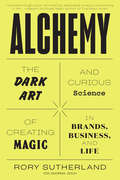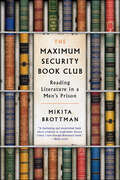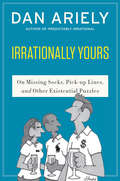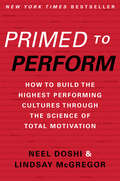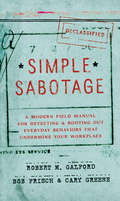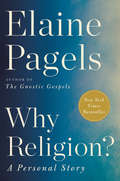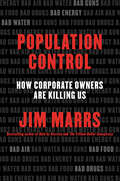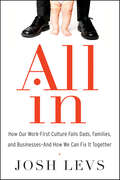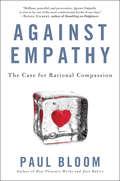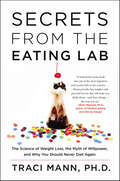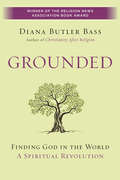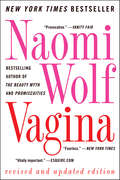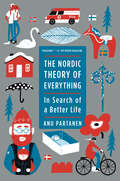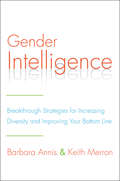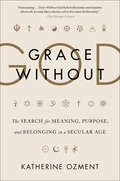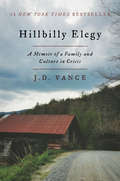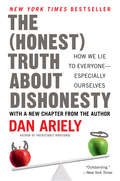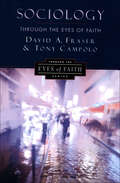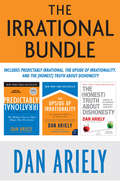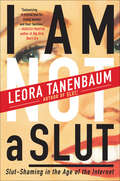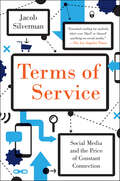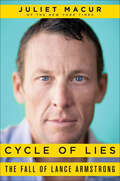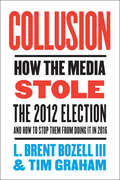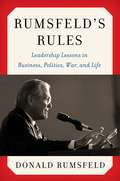- Table View
- List View
Alchemy: The Dark Art and Curious Science of Creating Magic in Brands, Business, and Life
by Rory SutherlandHOW DOES MAGIC HAPPEN? The Ogilvy advertising legend—“one of the leading minds in the world of branding” (NPR)—explores the art and science of conjuring irresistible products and ideas."A breakthrough book. Wonderfully applicable to about everything in life." —Nassim Nicholas Taleb, author of The Black Swan“Veins of wisdom emerge regularly and brilliantly from these pages. Don't miss this book.” —Robert B. Cialdini, author of InfluenceWhy is Red Bull so popular, though everyone—everyone!—hates the taste? Humans are, in a word, irrational, basing decisions as much on subtle external signals (that little blue can) as on objective qualities (flavor, price, quality). The surrounding world, meanwhile, is irreducibly complex and random. This means future success can’t be projected on any accounting spreadsheet. To strike gold, you must master the dark art and curious science of conjuring irresistible ideas: alchemy.Based on thirty years of field work inside the largest experiment in human behavior ever conceived—the forever-unfolding pageant of consumer capitalism—Alchemy, the revolutionary book by Ogilvy advertising legend Rory Sutherland, whose TED talks have been viewed nearly seven million times, decodes human behavior, blending leading-edge scientific research, absurdly entertaining storytelling, deep psychological insight, and practical case studies from his storied career working on campaigns for AmEx, Microsoft, and others.Heralded as “one of the leading minds in the world of branding” by NPR, Sutherland is a unique thought leader, as comfortable exchanging ideas with Nobel Prize winners Daniel Kahneman and Richard Thaler (both interviewed in these pages) as he is crafting the next product launch. His unconventional and relentlessly curious approach has led him to discover that the most compelling secrets to human decision-making can be found in surprising places:What can honey bees teach us about creating a sustainable business?How could budget airlines show us how to market a healthcare system?Why is it better to be vaguely right than precisely wrong?What might soccer penalty kicks teach us about the dangers of risk-aversion?Better “branding,” Sutherland reveals, can also be employed not just to sell products, but to promote a variety of social aims, like getting people to pay taxes, improving public health outcomes, or encouraging more women to pursue careers in tech. Equally startling and profound, Sutherland’s journey through the strange world of decision making is filled with astonishing lessons for all aspects of life and business.
The Maximum Security Book Club: Reading Literature in a Men's Prison
by Mikita BrottmanA riveting account of the two years literary scholar Mikita Brottman spent reading literature with criminals in a maximum-security men’s prison outside Baltimore, and what she learned from them—Orange Is the New Black meets Reading Lolita in Tehran.On sabbatical from teaching literature to undergraduates, and wanting to educate a different kind of student, Mikita Brottman starts a book club with a group of convicts from the Jessup Correctional Institution in Maryland. She assigns them ten dark, challenging classics—including Conrad’s Heart of Darkness, Shakespeare’s Macbeth, Stevenson’s Dr. Jekyll and Mr. Hyde, Poe’s story “The Black Cat,” and Nabokov’s Lolita—books that don’t flinch from evoking the isolation of the human struggle, the pain of conflict, and the cost of transgression. Although Brottman is already familiar with these works, the convicts open them up in completely new ways. Their discussions may “only” be about literature, but for the prisoners, everything is at stake.Gradually, the inmates open up about their lives and families, their disastrous choices, their guilt and loss. Brottman also discovers that life in prison, while monotonous, is never without incident. The book club members struggle with their assigned reading through solitary confinement; on lockdown; in between factory shifts; in the hospital; and in the middle of the chaos of blasting televisions, incessant chatter, and the constant banging of metal doors.Though The Maximum Security Book Club never loses sight of the moral issues raised in the selected reading, it refuses to back away from the unexpected insights offered by the company of these complex, difficult men. It is a compelling, thoughtful analysis of literature—and prison life—like nothing you’ve ever read before.
Irrationally Yours: On Missing Socks, Pickup Lines, and Other Existential Puzzles
by Dr Dan Ariely William HaefeliNew York Times bestselling author Dan Ariely teams up with legendary New Yorker cartoonist William Haefeli to present an expanded, illustrated anthology of his immensely popular Wall Street Journal advice column, "Ask Ariely."Social scientist Dan Ariely revolutionized the way we think about ourselves, our minds, and our actions in his books Predictably Irrational, The Upside of Irrationality, and The (Honest) Truth About Dishonesty. Ariely applies this scientific analysis of the human condition in his "Ask Ariely" Q&A column in the Wall Street Journal, in which he responds to readers who write in with personal conundrums, ranging from the serious to the curious. What can you do to stay calm when you're playing the volatile stock market? What's the best way to get someone to stop smoking? How can you maximize the return on your investment at an all-you-can-eat buffet? Is it possible to put a price on the human soul? Can you ever rationally justify spending thousands of dollars on a Rolex?With their trademark insight and wit, Ariely and Haefeli help us reflect on how we can reason our way through external and internal challenges. Readers will laugh, learn, and, most important, gain a new perspective on how to deal with the inevitable problems that plague daily life.
Primed to Perform: How to Build the Highest Performing Cultures Through the Science of Total Motivation
by Lindsay Mcgregor Neel DoshiWhy do some workplace cultures inspire energy and innovation, while others fuel anxiety, boredom, or cynicism? Until now, such legendary cultures have seemed like magic beyond our control. However, behind every culture is a surprisingly elegant science. Primed to Perform proves that the highest-performing cultures are built on a simple truth: why people work affects how well they work. Great organizations inspire the three most powerful motives for work--play, purpose, and potential--and eliminate the three most destructive--emotional pressure, economic pressure, and inertia. They create total motivation (or ToMo, for short). Total motivation cultures create the highest-performing employees and the most adaptive organizations.Authors Neel Doshi and Lindsay McGregor show that extraordinary performance at companies like Southwest Airlines, Starbucks, Apple, and Whole Foods comes from cultures that inspire total motivation. They describe how investment professionals, salespeople, teachers, and CEOs perform better when driven by total motivation. And, most important, they share how you can build a culture that inspires total motivation in every moment of every day.Primed to Perform builds on over a century of academic thinking as well as the authors' original research into how ToMo drives performance at iconic companies. It introduces the authors' highly predictive new measurement tool, the total motivation factor, which allows leaders to measure the strength of their culture and understand how it changes over time. It gives leaders the tools to transform their own workplaces.High-performing cultures can't be left to chance; organizations must create systems that shape and maintain them. Whether you're a five-person team or a start-up, an elementary school or a university, a nonprofit or a mega-institution, Primed to Perform shows you how.
Simple Sabotage: A Modern Field Manual for Detecting and Rooting Out Everyday Behaviors That Undermine Your Workplace
by Robert M. Galford Bob Frisch Cary GreeneInspired by the Simple Sabotage Field Manual released by the Office of Strategic Services in 1944 to train European resistors, this is the essential handbook to help stamp out unintentional sabotage in any working group, from major corporations to volunteer PTA committees.In 1944, the Office of Strategic Services (OSS)--the predecessor of today's CIA--issued the Simple Sabotage Field Manual that detailed sabotage techniques designed to demoralize the enemy. One section focused on eight incredibly subtle--and devastatingly destructive--tactics for sabotaging the decision-making processes of organizations. While the manual was written decades ago, these sabotage tactics thrive undetected in organizations today: Insist on doing everything through channels. Make speeches. Talk as frequently as possible and at great length. Refer all matters to committees. Bring up irrelevant issues as frequently as possible. Haggle over precise wordings of communications. Refer back to matters already decided upon and attempt to question the advisability of that decision. Advocate caution and urge fellow-conferees to avoid haste that might result in embarrassments or difficulties later on. Be worried about the propriety of any decision.Everyone has been faced with someone who has used these tactics, even when they have meant well. Filled with proven strategies and techniques, this brief, clever book outlines the counter-sabotage measures to detect and reduce the impact of these eight classic sabotage tactics to improve productivity, spur creativity, and engender better collegial relationships.
Why Religion?: A Personal Story
by Elaine PagelsOne of PW’s Best Books of the YearOne of Amazon’s Best Books of the MonthWhy is religion still around in the twenty-first century? Why do so many still believe? And how do various traditions still shape the way people experience everything from sexuality to politics, whether they are religious or not? In Why Religion? Elaine Pagels looks to her own life to help address these questions.These questions took on a new urgency for Pagels when dealing with unimaginable loss—the death of her young son, followed a year later by the shocking loss of her husband. Here she interweaves a personal story with the work that she loves, illuminating how, for better and worse, religious traditions have shaped how we understand ourselves; how we relate to one another; and, most importantly, how to get through the most difficult challenges we face. Drawing upon the perspectives of neurologists, anthropologists, and historians, as well as her own research, Pagels opens unexpected ways of understanding persistent religious aspects of our culture. A provocative and deeply moving account from one of the most compelling religious thinkers at work today, Why Religion? explores the spiritual dimension of human experience.
Population Control: How Corporate Owners Are Killing Us
by Jim MarrsFrom the food we eat, the water we drink to the air we breathe, everything these days seems capable of killing us. Recently we have seen an unprecedented number of deaths due to medications for diseases that may not even exist, obscure cancers caused by our modern devices, and brutal police tactics. All a coincidence? Think again. In Population Control, acclaimed journalist Jim Marrs lays out a stunning case for his most audacious conspiracy yet: the scheme concocted by a handful of global elites to reduce the world’s population to 500 million by whatever means necessary and make a profit from it.Marrs, the bestselling author of Rule by Secrecy and The Trillion Dollar Conspiracy, pulls no punches in exposing this evil and chillingly effective plan. He explains how a small group of tremendously wealthy and powerful people control virtually every important industry – guns, oil, pharmaceuticals, food, and of course the media – and how it uses this vast network of conglomerates to take actions that lead to the deaths of men and women all over the world.In the explosive Population Control, Marrs lays bare the damning truths corporate owners don’t want you to discover: how they’ve spied on private citizens, intentionally spread disease, and destroyed the planet chasing profits, all to improve the lives of a privileged few while eliminating everyone else. Finally, he offers a citizen’s blueprint for fighting back.
All In: How Our Work-First Culture Fails Dads, Families, and Businesses—And How We Can Fix It Together
by Josh LevsWhen journalist Josh Levs was denied fair parental leave by his employer after his child was born, he fought back—and won. Since then, he’s become an advocate for modern families and working fathers. In All In, he explores the changing face of fatherhood and what it means for our individual lives, families, workplaces, and society.Fatherhood today is far different from previous generations. Stay-at-home dads are increasingly common, and growing numbers of men are working part-time or flextime schedules to spend more time with their children. Even the traditional breadwinner-dad is being transformed. Dads today are more emotionally and physically involved on the home front. They are “all in” and—like mothers—they are struggling with work-life balance and doing it all.Journalist and “dad columnist” Josh Levs explains that despite these unprecedented changes, our laws, corporate policies, and gender-based expectations in the workplace remain rigid. They are preventing both women and men from living out the equality we believe in—and hurting businesses in the process. Women have done a great job of speaking out about this, Levs—whose fight for parental leave made front page news across the country—argues. It’s now time for men to join in.Combining Levs’ personal experiences with investigative reporting and frank conversations with fathers about everything from work life to money to sex, All In busts popular myths, lays out facts, uncovers the forces holding all of us back, and shows how we can all join together to change them.
Against Empathy: The Case for Rational Compassion
by Paul BloomWe often think of our capacity to experience the suffering of others as the ultimate source of goodness. Many of our wisest policy-makers, activists, scientists, and philosophers agree that the only problem with empathy is that we don't have enough of it.Nothing could be farther from the truth, argues Yale researcher Paul Bloom. In AGAINST EMPATHY, Bloom reveals empathy to be one of the leading motivators of inequality and immorality in society. Far from helping us to improve the lives of others, empathy is a capricious and irrational emotion that appeals to our narrow prejudices. It muddles our judgment and, ironically, often leads to cruelty. We are at our best when we are smart enough not to rely on it, but to draw instead upon a more distanced compassion. Basing his argument on groundbreaking scientific findings, Bloom makes the case that some of the worst decisions made by individuals and nations--who to give money to, when to go to war, how to respond to climate change, and who to imprison--are too often motivated by honest, yet misplaced, emotions. With precision and wit, he demonstrates how empathy distorts our judgment in every aspect of our lives, from philanthropy and charity to the justice system; from medical care and education to parenting and marriage. Without empathy, Bloom insists, our decisions would be clearer, fairer, and--yes--ultimately more moral.Brilliantly argued, urgent and humane, AGAINST EMPATHY shows us that, when it comes to both major policy decisions and the choices we make in our everyday lives, limiting our impulse toward empathy is often the most compassionate choice we can make.
Secrets From the Eating Lab: The Science of Weight Loss, the Myth of Willpower, and Why You Should Never Diet Again
by Traci MannA provocative expose of the dieting industry from one of the nation’s leading researchers in self-control and the psychology of weight loss that offers proven strategies for sustainable weight loss.From her office in the University of Minnesota’s Health and Eating Lab, professor Traci Mann researches self-control and dieting. And what she has discovered is groundbreaking. Not only do diets not work; they often result in weight gain. Americans are losing the battle of the bulge because our bodies and brains are not hardwired to resist food—the very idea of it works against our biological imperative to survive.In Secrets From the Eating Lab, Mann challenges assumptions—including those that make up the very foundation of the weight loss industry—about how diets work and why they fail. The result of more than two decades of research, it offers cutting-edge science and exciting new insights into the American obesity epidemic and our relationship with eating and food.Secrets From the Eating Lab also gives readers the practical tools they need to actually lose weight and get healthy. Mann argues that the idea of willpower is a myth—we shouldn’t waste time and money trying to combat our natural tendencies. Instead, she offers 12 simple, effective strategies that take advantage of human nature instead of fighting it—from changing the size of your plates to socializing with people with healthy habits, removing “healthy” labels that send negative messages to redefining comfort food.
Grounded: Finding God in the World-A Spiritual Revolution
by Diana Butler BassThe headlines are clear: religion is on the decline in America as many people leave behind traditional religious practices. Diana Butler Bass, leading commentator on religion, politics, and culture, follows up her acclaimed book Christianity After Religion by arguing that what appears to be a decline actually signals a major transformation in how people understand and experience God. The distant God of conventional religion has given way to a more intimate sense of the sacred that is with us in the world. This shift, from a vertical understanding of God to a God found on the horizons of nature and human community, is at the heart of a spiritual revolution that surrounds us - and that is challenging not only religious institutions but political and social ones as well.Grounded explores this cultural turn as Bass unpacks how people are finding new spiritual ground by discovering and embracing God everywhere in the world around us--in the soil, the water, the sky, in our homes and neighborhoods, and in the global commons. Faith is no longer a matter of mountaintop experience or institutional practice; instead, people are connecting with God through the environment in which we live. Grounded guides readers through our contemporary spiritual habitat as it points out and pays attention to the ways in which people experience a God who animates creation and community.Bass brings her understanding of the latest research and studies and her deep knowledge of history and theology to Grounded. She cites news, trends, data, and pop culture, weaves in spiritual texts and ancient traditions, and pulls it all together through stories of her own and others' spiritual journeys. Grounded observes and reports a radical change in the way many people understand God and how they practice faith. In doing so, Bass invites readers to join this emerging spiritual revolution, find a revitalized expression of faith, and change the world.
Vagina: Revised And Updated
by Naomi WolfAn astonishing work of cutting–edge science and cultural history from one of our most respected cultural critics and thinkers, Naomi Wolf, author of the modern classic The Beauty MythWhen an unexpected medical crisis sends Naomi Wolf on a journey to tease out the intersections between sexuality and creativity, she discovers—much to her own astonishment—an increasing body of scientific evidence that documents new insights about female sexual response. These breakthrough discoveries show that the vagina, clitoris, and labia—the female sexual centers—are not "merely flesh," but directly affect the female brain, and that the female brain directly affects, in newly documented ways, the vagina and female sexual centers. The vagina thus has a fundamental relationship to female consciousness itself. Utterly enthralling and totally fascinating, Vagina draws on this set of insights about "the mind-vagina connection" to reveal new information about what women really need, on many different levels, and considers what sexual relationships—and a woman's relationship to her self, as well as to her own desire and pleasure—transformed by these insights, may look like.A brilliant and nuanced synthesis of physiology, history, and cultural criticism, Vagina explores the physical, political, and spiritual implications for women—and for society as a whole—in this startling series of new scientific breakthroughs from a writer whose conviction and keen intelligence have propelled her works to the tops of bestseller lists, and firmly into the realm of modern classics.
The Nordic Theory of Everything: In Search of a Better Life
by Anu PartanenA Finnish journalist, now a naturalized American citizen, asks Americans to draw on elements of the Nordic way of life to nurture a fairer, happier, more secure, and less stressful society for themselves and their children.Moving to America in 2008, Finnish journalist Anu Partanen quickly went from confident, successful professional to wary, self-doubting mess. She found that navigating the basics of everyday life--from buying a cell phone and filing taxes to education and childcare--was much more complicated and stressful than anything she encountered in her homeland. At first, she attributed her crippling anxiety to the difficulty of adapting to a freewheeling new culture. But as she got to know Americans better, she discovered they shared her deep apprehension. To understand why life is so different in the U.S. and Finland, Partanen began to look closely at both.In The Nordic Theory of Everything, Partanen compares and contrasts life in the United States with life in the Nordic region, focusing on four key relationships--parents and children, men and women, employees and employers, and government and citizens. She debunks criticism that Nordic countries are socialist "nanny states," revealing instead that it is we Americans who are far more enmeshed in unhealthy dependencies than we realize. As Partanen explains step by step, the Nordic approach allows citizens to enjoy more individual freedom and independence than we do.Partanen wants to open Americans' eyes to how much better things can be--to show her beloved new country what it can learn from her homeland to reinvigorate and fulfill the promise of the American dream--to provide the opportunity to live a healthy, safe, economically secure, upwardly mobile life for everyone. Offering insights, advice, and solutions, The Nordic Theory of Everything makes a convincing argument that we can rebuild our society, rekindle our optimism, and restore true freedom to our relationships and lives.
Gender Intelligence
by Keith Merron Barbara AnnisWorld-renowned experts on Gender Intelligence argue that it is time to move beyond politics and fairness to build an economic business case for gender diversity in the workplace.For too long, companies have played the numbers game--attempting to tackle the problem of gender imbalance through affirmative action, numeric standards, and quotas. Yet these efforts have had no measurable impact on the number of women in leadership or on a company's bottom line. Meanwhile, the dominant paradigm of traditional business remains the same.In Gender Intelligence, Barbara Annis and Keith Merron introduce a revolutionary and effective approach that is fundamentally altering the cultures of major corporations around the world. They uncover the forces that create the current condition of gender inequality and reveal, for the first time, the powerful principles that are bringing about a shift in thinking. They highlight organizations that have made the transformation from a focus on gender equity to the more powerful objective of welcoming the natural differences between men and women, which ultimately produces greater economic value. Gender Intelligence proves that the true measure of gender equality does not reside in a percentage but in the untapped power of men and women openly working and winning together.
Grace Without God: The Search for Meaning, Purpose, and Belonging in a Secular Age
by Katherine OzmentMeet “the Nones”—In this thought-provoking exploration of secular America, celebrated journalist Katherine Ozment takes readers on a quest to understand the trends and ramifications of a nation in flight from organized religion.Studies show that religion makes us happier, healthier and more giving, connecting us to our past and creating tight communal bonds. Most Americans are raised in a religious tradition, but in recent decades many have begun to leave religion, and with it their ancient rituals, mythic narratives, and sense of belonging.So how do the nonreligious fill the need for ritual, story, community, and, above all, purpose and meaning without the one-stop shop of religion? What do they do with the space left after religion? With Nones swelling to one-fourth of American adults, and more than one-third of those under thirty, these questions have never been more urgent.Writer, journalist, and secular mother of three Katherine Ozment came face-to-face with the fundamental issue of the Nones when her son asked her the simplest of questions: “what are we?” Unsettled by her reply—“Nothing”—she set out on a journey to find a better answer. She traversed the frontier of American secular life, sought guidance in science and the humanities, talked with noted scholars, and wrestled with her own family’s attempts to find meaning and connection after religion.Insightful, surprising, and compelling, Grace Without God is both a personal and critical exploration of the many ways nonreligious Americans create their own meaning and purpose in an increasingly secular age.
Hillbilly Elegy: A Memoir of a Family and Culture in Crisis
by J. D. Vance<P>From a former marine and Yale Law School graduate, a powerful account of growing up in a poor Rust Belt town that offers a broader, probing look at the struggles of America's white working class. <P>Hillbilly Elegy is a passionate and personal analysis of a culture in crisis--that of white working-class Americans. The decline of this group, a demographic of our country that has been slowly disintegrating over forty years, has been reported on with growing frequency and alarm, but has never before been written about as searingly from the inside. J. D. Vance tells the true story of what a social, regional, and class decline feels like when you were born with it hung around your neck. <P>The Vance family story begins hopefully in postwar America. J. D.'s grandparents were "dirt poor and in love," and moved north from Kentucky's Appalachia region to Ohio in the hopes of escaping the dreadful poverty around them. They raised a middle-class family, and eventually their grandchild (the author) would graduate from Yale Law School, a conventional marker of their success in achieving generational upward mobility. <P>But as the family saga of Hillbilly Elegy plays out, we learn that this is only the short, superficial version. Vance's grandparents, aunt, uncle, sister, and, most of all, his mother, struggled profoundly with the demands of their new middle-class life, and were never able to fully escape the legacy of abuse, alcoholism, poverty, and trauma so characteristic of their part of America. Vance piercingly shows how he himself still carries around the demons of their chaotic family history. <P>A deeply moving memoir with its share of humor and vividly colorful figures, Hillbilly Elegy is the story of how upward mobility really feels. And it is an urgent and troubling meditation on the loss of the American dream for a large segment of this country. <P><b>A New York Times Bestseller</b>
The Honest Truth About Dishonesty: How We Lie to Everyone--Especially Ourselves (Ebook Bundle Ser.)
by Dan ArielyThe New York Times bestselling author of Predictably Irrational and The Upside of Irrationality returns with thought-provoking work to challenge our preconceptions about dishonesty and urge us to take an honest look at ourselves. Does the chance of getting caught affect how likely we are to cheat?How do companies pave the way for dishonesty?Does collaboration make us more honest or less so?Does religion improve our honesty?Most of us think of ourselves as honest, but, in fact, we all cheat. From Washington to Wall Street, the classroom to the workplace, unethical behavior is everywhere. None of us is immune, whether its the white lie to head off trouble or padding our expense reports. In The (Honest) Truth About Dishonesty, award-winning, bestselling author Dan Ariely turns his unique insight and innovative research to the question of dishonesty. Generally, we assume that cheating, like most other decisions, is based on a rational cost-benefit analysis. But Ariely argues, and then demonstrates, that its actually the irrational forces that we dont take into account that often determine whether we behave ethically or not. For every Enron or political bribe, there are countless puffed resumes, hidden commissions, and knockoff purses. In The (Honest) Truth About Dishonesty, Ariely shows why some things are easier to lie about; how getting caught matters less than we think; and how business practices pave the way for unethical behavior, both intentionally and unintentionally. Ariely explores how unethical behavior works in the personal, professional, and political worlds, and how it affects all of us, even as we think of ourselves as having high moral standards. But all is not lost. Ariely also identifies what keeps us honest, pointing the way for achieving higher ethics in our everyday lives. With compelling personal and academic findings, The (Honest) Truth About Dishonesty will change the way we see ourselves, our actions, and others.
Sociology Through the Eyes of Faith (Through the Eyes of Faith)
by David A. Fraser Anthony CampoloColorfully written by two popular and respected sociologists, this volume shows how sociology has evolved, how it became divided from Christian faith, and how Christian sociologists can make sense of this branch of social science.
The Irrational Bundle
by Dr Dan ArielyDan Ariely's three New York Times bestselling books on his groundbreaking behavioral economics research, Predictably Irrational, The Upside of Irrationality, and The (Honest) Truth About Dishonesty, are now available for the first time in a single volume.
The Irrational Bundle
by Dan ArielyDan Ariely's three New York Times bestselling books on his groundbreaking behavioral economics research, Predictably Irrational, The Upside of Irrationality, and The (Honest) Truth About Dishonesty, are now available for the first time in a single volume,
I Am Not a Slut: Slut-Shaming in the Age of the Internet
by Leora TanenbaumThe author of the groundbreaking work Slut! explores the phenomenon of slut-shaming in the age of sexting, tweeting, and “liking.” She shows that the sexual double standard is more dangerous than ever before and offers wisdom and strategies for alleviating its destructive effects on young women’s lives.Young women are encouraged to express themselves sexually. Yet when they do, they are derided as “sluts.” Caught in a double bind of mixed sexual messages, young women are confused. To fulfill the contradictory roles of being sexy but not slutty, they create an “experienced” identity on social media-even if they are not sexually active—while ironically referring to themselves and their friends as “sluts.”But this strategy can become a weapon used against young women in the hands of peers who circulate rumors and innuendo—elevating age-old slut-shaming to deadly levels, with suicide among bullied teenage girls becoming increasingly common. Now, Leora Tanenbaum revisits her influential work on sexual stereotyping to offer fresh insight into the digital and face-to-face worlds contemporary young women inhabit. She shares her new research, involving interviews with a wide range of teenage girls and young women from a variety of backgrounds as well as parents, educators, and academics. Tanenbaum analyzes the coping mechanisms young women currently use and points them in a new direction to eradicate slut-shaming for good.
Terms of Service: Social Media and the Price of Constant Connection
by Jacob SilvermanSocial networking has grown into a staple of modern society, but its continued evolution is becoming increasingly detrimental to our lives. Shifts in communication and privacy are affecting us more than we realize or understand. Terms of Service crystalizes this current moment in technology and contemplates its implications: the identity-validating pleasures and perils of online visibility; our newly adopted view of daily life through the lens of what is share-worthy; and the surveillance state operated by social media platforms—Facebook, Google, Twitter, and others—to mine our personal data for advertising revenue, an invasion of our lives that is as pervasive as government spying.Jacob Silverman calls for social media users to take back ownership of their digital selves from the Silicon Valley corporations who claim to know what's best for them. Integrating politics, sociology, national security, pop culture, and technology, he reveals the surprising conformity at the heart of Internet culture—explaining how social media companies engineer their products to encourage shallow engagement and discourage dissent. Reflecting on the collapsed barriers between our private and public lives, Silverman brings into focus the inner conflict we feel when deciding what to share and what to "like," and explains how we can take the steps we need to free ourselves from its grip.
Cycle of Lies: The Fall of Lance Armstrong
by Juliet MacurThe definitive account of Lance Armstrong's spectacular rise and fall.In June 2013, when Lance Armstrong fled his palatial home in Texas, downsizing in the face of multimillion-dollar lawsuits, Juliet Macur was there—talking to his girlfriend and children and listening to Armstrong's version of the truth. She was one of the few media members aside from Oprah Winfrey to be granted extended one-on-one access to the most famous pariah in sports.At the center of Cycle of Lies is Armstrong himself, revealed through face-to-face interviews.But this unfolding narrative is given depth and breadth by the firsthand accounts of more than one hundred witnesses, including family members whom Armstrong had long since turned his back on—the adoptive father who gave him the Armstrong name, a grandmother, an aunt. Perhaps most damning of all is the taped testimony of the late J.T. Neal, the most influential of Armstrong's many father figures, recorded in the final years of Neal's life as he lost his battle with cancer just as Armstrong gained fame for surviving the disease.In the end, it was Armstrong's former friends, those who had once occupied the precious space of his inner circle, who betrayed him. They were the ones who dealt Armstrong his fatal blow by breaking the code of silence that shielded the public from the grim truth about the sport of cycling—and the grim truth about its golden boy, Armstrong.Threading together the vivid and disparate voices of those with intimate knowledge of the private and public Armstrong, Macur weaves a comprehensive and unforgettably rich tapestry of one man's astonishing rise to global fame and fortune and his devastating fall from grace.
Collusion: How the Media Stole the 2012 Election---and How to Stop Them from Doing It in 2016
by Brent Bozell III Tim GrahamNever before has the so-called mainstream media shown such naked political bias as in the 2012 presidential election.In 2012 Barack Obama was narrowly reelected, with naked support from a liberal media desperate to hide his failures, trumpet his accomplishments, and discredit his GOP rivals. Bachmann, Perry, Cain, Gingrich, Santorum: one by one the media took them apart using hidden-camera exposés, innuendo from anonymous accusers, repetition of harmful sound bites, and irrelevant—even untrue—storytelling.As soon as Mitt Romney emerged as the Republican Party's nominee, the liberal media went to work in earnest. They repeated Obama's campaign caricatures that Romney terrified his family dog, enjoyed firing people, and was nothing more than a willing tool of wealthy radical-right extremists. The Washington Post published a 5,400-word "exposé" on the allegation that in 1965 he may have pinned down a boy and cut his hair. Those same Post readers were then treated to 5,500 words on Barack Obama's lifelong love of basketball.Unquestionably, 2012 was the year when the liberal news media did all in their power to steal the presidential election—and they arguably succeeded. Media Research Center Founder and President Brent Bozell and MRC Director of Media Analysis Tim Graham provide the dramatic and conclusive evidence to prove this point—and show conservatives how to put an end to the leftist media agenda threatening democracy itself.
Rumsfeld's Rules
by Donald RumsfeldThe legendary leadership guide, distilled from a lifetime of wisdom and experience in government and businessThroughout his long and distinguished career--as a naval aviator, a U. S. Congressman, a top aide to four American presidents, a high-level diplomat, a CEO of two Fortune 500 companies, and the only twice-serving Secretary of Defense in American history--Donald Rumsfeld has collected hundreds of pithy, compelling, and often humorous observations about leadership, business, and life. When President Gerald Ford ordered these aphorisms distributed to his White House staff in 1974, the collection became known as "Rumsfelds Rules. "First gathered as three-by-five cards in a shoebox and then typed up and circulated informally over the years, these eminently nonpartisan rules have amused and enlightened presidents, business executives, chiefs of staff, foreign officials, diplomats, and members of Congress. They earned praise from the Wall Street Journal as "Required reading," and from the New York Times which said: "Rumsfelds Rules can be profitably read in any organization. . . The best reading, though, are his sprightly tips on inoculating oneself against that dread White House disease, the inflated ego. "Meanwhile, the collection continued to grow as Rumsfeld added new rules derived from things he read, heard, or observed in more than eight decades of a remarkable life. Now these legendary rules are made available for the first time to corporate executive. Rumsfeld has selected his most useful and important rules for effective leadership, enhanced with fresh insights and entertaining anecdotes, and discusses them in the blunt and witty style that made his Pentagon press conferences "must-see TV. "Distilled from a career of unusual breadth and accomplishment, and organized under practical topics like hiring people, running a meeting, and dealing with the press, Rumsfelds Rules can benefit people at every stage in their careers and in every walk of life, from aspiring politicos and industrialists to recent college graduates, teachers, and business leaders. The book provides unprecedented insight into leadership, management, strategy, and life--thinking that not only helped Rumsfeld lead the Pentagon in wartime, but earned him a reputation as one of Americas toughest and most effective CEOs.
